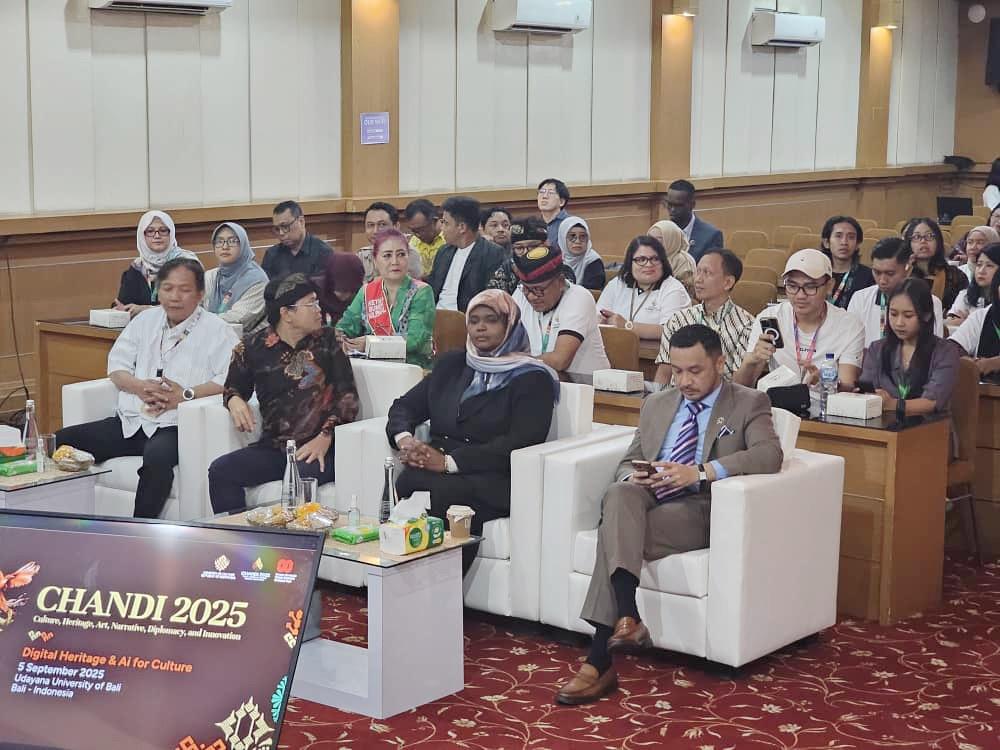Toghi: Culture is a human bridge to build a just and peaceful future.
Pulbished on:
Bali, September 6, 2025 (LANA) – Minister of Culture and Knowledge Development, Mabrouka Toghi, participated in the activities of the first edition of the Culture, Heritage, Arts, Diplomacy, and Innovation Summit (CHANDI 2025), hosted by Bali, Indonesia, from September 3 to 5, under the theme: "Culture for the Future."
During the summit, the Minister participated in two panel discussions within the discussion program, which addressed several pivotal issues related to "the culture of the future," including: identity, heritage, and innovation; the role of culture in building bridges between nations; promoting global cultural leadership; reclaiming history and justice; international cooperation for the recovery of cultural property and traditional knowledge; and building resilient and inclusive societies in the post-2030 world. Topics such as intangible cultural heritage, digital transformation, and artificial intelligence for culture were also discussed.
In a special session titled "The Future of Intangible Cultural Heritage," the Minister emphasized in her speech that the summit represents a global trend that reflects a shared human awareness to confront contemporary challenges. She considered culture to be a unifying element within societies and among them at the international level.
She noted that "the proper preparation and planning for the summit made it a global event that requires intellectual and cognitive follow-up." She added that culture—if properly understood—represents a fundamental element in establishing justice, peace, and security, and building a shared future for humanity.
She said, "Within the framework of intercultural dialogue and cultural understanding, it is confirmed that humanity is moving together toward a better future, where culture is the engine of shared progress."
The Minister highlighted the important role played by Indonesia in hosting the summit, emphasizing that these global cultural initiatives contribute to achieving the Sustainable Development Goals and promoting world peace.
Toghi emphasized the need to ensure the continuity and integrity of intangible cultural heritage, emphasizing that "this heritage must be a legacy for generations and a tool in confronting current challenges, both internally and externally."
She also explained that discussing the future of intangible heritage should begin with a critique of the past, an analysis of the present, and a vision for the future, based on scientific and practical approaches that make intangible culture a common vessel for building a more just and equitable world.
In a session devoted to the theme "Artificial Intelligence for Culture," the Minister considered technology and artificial intelligence to be important tools for human progress, but they require controls to ensure their use remains solely within a positive framework.
She said, "Scientific progress should not be viewed as an absolute good, but rather should be coupled with caution and responsibility, as the true criterion for the future is knowledge, science, and the good of humanity."
At the end of her participation, the Minister of Culture in the Government of National Unity called for the need to respect human beings and their dignity at all times and in all places, noting the importance of global cultural cooperation as a bridge for understanding and communication, and criminalizing aggression and racism.
She emphasized that culture, with its tangible and intangible components, represents a launching pad for a shared human future characterized by justice, peace, and coexistence, and that a shared cultural vision is the way to confront contemporary challenges and build a more just and humane world.
...(LANA)...




